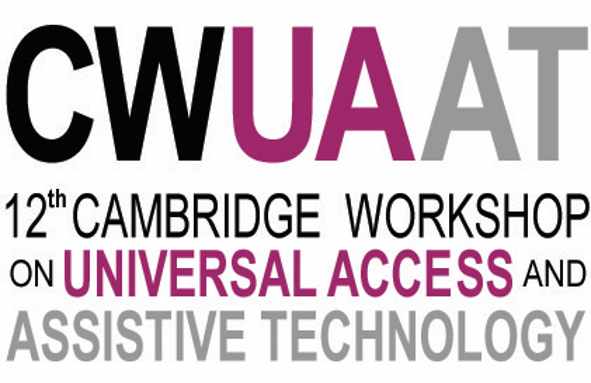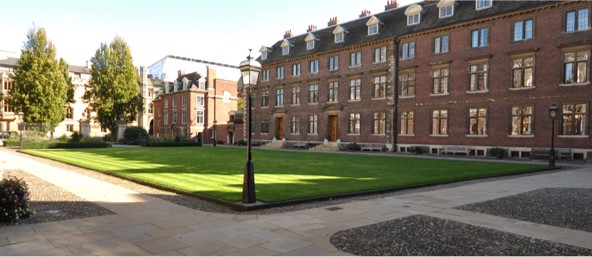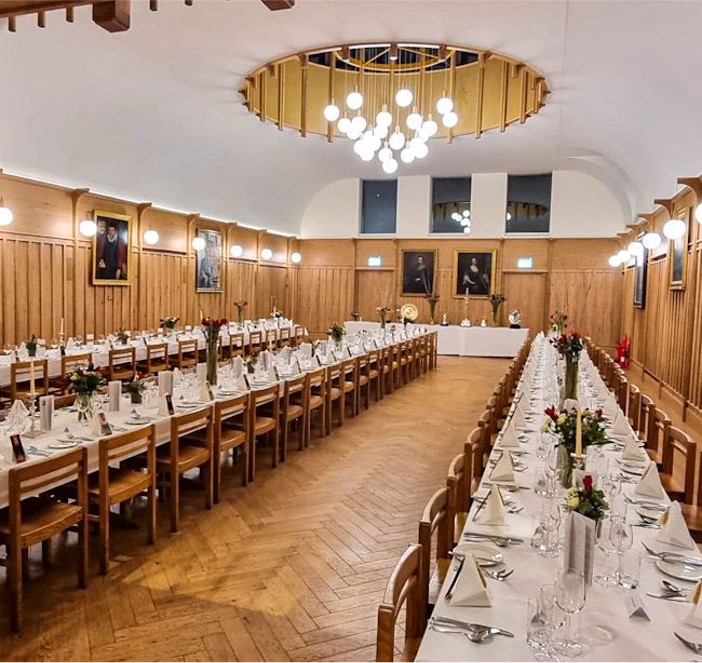The Cambridge Workshop on Universal Access and Assistive Technology (CWUAAT) series has been running since 2002, hosting the multifaceted dialogue on design for inclusion. It involves a wide range of disciplines including design, computer science, engineering, architecture, ergonomics and human factors, policy and gerontology. The biannual workshop is characterised by a single session running over three days in pleasant surroundings. Past attendees to CWUAAT have enthused about the ability to easily meet and socialize with new colleagues who share similar interests, but are from other disciplines.
CWUAAT 2025 will be held on 2-4 April 2025 in St Catharine’s College, a beautiful college in the centre of Cambridge, UK. As well as the paper and poster sessions, it includes a traditional Cambridge three-course gala dinner and plenty of networking opportunities.
Please note: the submission deadline for long papers is earlier this year than for the previous CWUAAT — 8 July 2024!
On this page:
Conference theme and special topics
The theme for CWUAAT 2025 is New Frontiers for Inclusion.
Inclusive design, universal access and assistive technology continue to be important topics in light of the ageing population and increased awareness of the diversity of people’s needs. Submissions to CWUAAT 2025 are welcomed on all topics in these areas. As well as submissions on the traditional aspects of design and disability or ageing, we welcome papers that examine new frontiers for inclusion, such as:
- socio-economic and other areas of diversity and inclusion;
- intersectionality - competing and complementary needs between different areas of diversity;
- inclusive design in particularly challenging contexts;
- the possibilities and challenges for inclusive design offered by AI and other emerging technologies.
Submitting a paper
Papers can be submitted to one of two categories: long papers and poster papers. All submitted papers will be peer-reviewed by an international panel of currently active researchers. Accepted long papers will be published in a volume by Springer and presented orally at CWUAAT. Accepted poster papers will be published in a technical report and presented as a poster.
Long papers should be 6-8 pages long and poster papers should be 2-4 pages long. A page contains roughly 300-400 words, although this varies depending on the use of tables and figures. Details on the format for papers, including a Word template file, can be found on Springer’s webpage on Information for authors of Springer proceedings.
Papers should report on original research that has neither been published nor submitted for publication elsewhere.
Authors of accepted long papers will have to sign a Consent to Publish form, through which the copyright of their paper is transferred to Springer Nature. They will also need to obtain permission to use third-party material in their papers, including any photos that they did not take themselves or that contain recognisable images of people. They should also obtain permissions from previous publishers if they want to reuse any material that they have previously published. More information can be found on Springer’s webpage on Third party permissions. This includes permissions forms which can be used to obtain any relevant permissions.
The paper submission system will open on the 3rd June 2024. Other important dates can be found below .
Important dates
- 3 June 2024 Submission system opens
- 8 July 2024 Submission deadline for long papers
- 20 Sep 2024 Notification of long paper acceptance
- 11 Oct 2024 Submission deadline for poster papers
- 29 Nov 2024 Notification of poster paper acceptance
- 13 Dec 2024 Author registration deadline
- 2-4 April 2025 Conference
Proceedings of CWUAAT 2023
The proceedings of CWUAAT 2025 are not yet available. The proceedings from last year’s conference (CWUAAT 2023) are published as follows:
- Papers accepted for oral presentation at the conference are published in Design for Sustainable Inclusion, which is published by Springer.
- Papers accepted for poster presentation are published in a technical report, which is available on the University of Cambridge repository.
Organising committee
The organising and technical committee for CWUAAT 2025 is:
- Dr Joy Goodman-Deane, Engineering Design Centre, University of Cambridge, UK
- Prof Hua Dong, Brunel Design School, Brunel University, London, UK
- Prof Ann Heylighen, Resarch[x]Design group, KU Leuven, Belgium
- Prof Jonathan Lazar, University of Maryland and Maryland Initiative for Digital accessibility (MIDA), USA
- Dr Emilene Zitkus, School of Design and Creative Arts, Loughborough University, UK
- Dr Anke Brock, ENAC, Université Toulouse, France
- Prof P John Clarkson, Engineering Design Centre, University of Cambridge, UK
For further information please contact: edc-toolkit@eng.cam.ac.uk
Feedback
We would welcome your feedback on this page:
Privacy policy. If your feedback comments warrant follow-up communication, we will send you an email using the details you have provided. Feedback comments are anonymized and then stored on our file server. If you select the option to receive or contribute to the news bulletin, we will store your name and email address on our file server for the purposes of managing your subscription. You can unsubscribe and have your details deleted at any time, by using our Unsubscribe form. If you select the option to receive an activation code, we will store your name and email address on our fileserver indefinitely. This information will only be used to contact you for the specific purpose that you have indicated; it will not be shared. We use this personal information with your consent, which you can withdraw at any time.
Read more about how we use your personal data. Any e-mails that are sent or received are stored on our mail server for up to 24 months.




